
| San Marino |  |
General data Area: 61 km²
Population: 28,000
Density: 145 inhab/km²
Capital: San Marino
Languages: Italian (official language), the local dialect is the Emilie-Romagna
Origins: sanmarinans (83 %), Italians and some immigrants
Religion: catholic
GDP per capita: USD 15,000
Currency: Euro | 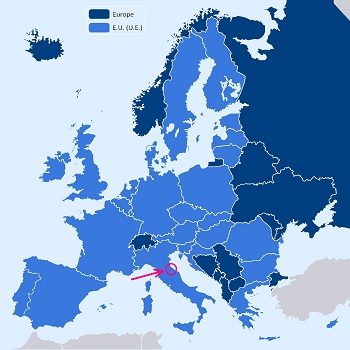 |
The survival of this medieval state within contemporary Italy is absolutely extraordinary, when we know at which point the search of the unity obsessed this country throughout the second half of the 19th century, but is finally well explained by its history and its privileged links with Garibaldi.
According to the legend, San Marino would be the oldest republic of the world, founded in 301 of our era.
It is in the 14th and 15th century that this small country affirms its difference, while trifling with the competitions between Rimini and Urbino. The Papacy tries to seize it, but in vain.
What will serve as “jurisprudence” to the safeguarding of its independence is the respect that Napoleon will have for it, confirmed after its defeat by the congress of Vienna.
Undoubtedly it is the reception given in 1849 to Garibaldi which will be determining: when Italy is finally reunified under the reign of Victor Emmanuel II, in 1862, a Treaty of Friendship establish its independence.
The several centuries old democratic regime entrusts the government to two “captains regent”, selected among the members of the Great Council (Parliament elected every five years), for a six months duration.
San Marino is member of UNO since the 2 March 1992. The official language is Italian, but the local dialect, spoken by the great majority of the autochtones, is the one of Emilie-Romagna.
San Marino and the Euro San Marino, taking into consideration his position inside Italy, always followed on the political and economic level of its large neighbour, while jealously taking care on his specificity.
Economically integrated into the EU, without in being one of its members, San Marino was in the same position as the Vatican and Monaco. The EU gave mandate to Italy to negotiate her passage to the single currency. As for the two other microstates, the solution found was to give to San Marino specific rights concerning the Euro: - national side
- exclusive right on the mintage
- identical application of the issuing’s rules than for the member states of the EU.
The minting workshop and the mintmarks
All the coins are produced by the minting workshop of Rome from which one can find the signature, a 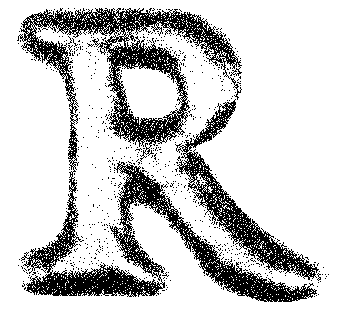 , on all the coins. It is noticed that the letter R used by the Mint of Rome is generally of the model with long leg. The name of the country appears in all letters SAN MARINO. Let us note that the Azienda Autonoma di Stato Filatelica e Numismatica (AASFN) puts on sale each year, in addition to the BU boxed set, a “mini-kit” with two, three or four circulation coins. Contrary with the boxed sets of 9 coins, these mini-kits are proposed by the AASFN only to the professional sellers. , on all the coins. It is noticed that the letter R used by the Mint of Rome is generally of the model with long leg. The name of the country appears in all letters SAN MARINO. Let us note that the Azienda Autonoma di Stato Filatelica e Numismatica (AASFN) puts on sale each year, in addition to the BU boxed set, a “mini-kit” with two, three or four circulation coins. Contrary with the boxed sets of 9 coins, these mini-kits are proposed by the AASFN only to the professional sellers. San Marino exerted all its rights as regards issuing, and its policy is simply described: - in 2002, one BU set very cheap… undoubtedly “too” cheap (€8,78)
- since 2003, the BU set comprises a coin of €5 and the selling price goes up to €40
- each year since 2002, a BU “mini-kit” to suit every budget
- a monetary institute of which it is very easy to become a customer, and thus to carry out “good bargains” at the time of the issues.
- the opportunity of issuing each year a €2 commemorative coin was completely exploited, not a year without since 2004. The only surprise is that San Marino is the only state to have introduced the Euro without starter kit. San Marino is one of the rare states to propose eight different designs which are among the most beautiful: - 1 cent: the Third Tower “Il Montale” (13th century)
- 2 cent: the Statue of Liberty of Stephano Galletti (1883-1905)
- 5 cent: the First Tower “Guaita” (10th-11th century)
- 10 cent: Basilica del Santo (19th century)
- 20 cent: Portrait of San Marinus according to a painting of Guercino (17th century)
- 50 cent: The fortress of San Marino
- €1: the Coat of Arms of the Republic of San Marino
- €2: the Government building “Domus Magna Comunis” (19th century)
| Since 2002 | 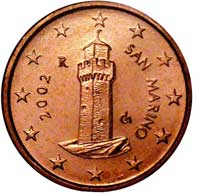 | 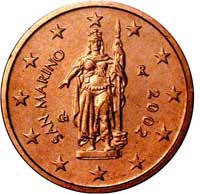 | 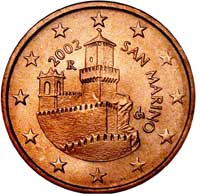 | 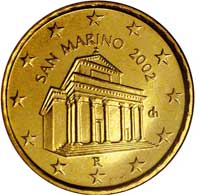 | | 1 cent | 2 cent | 5 cent | 10 cent | 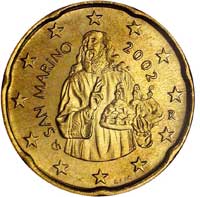 | 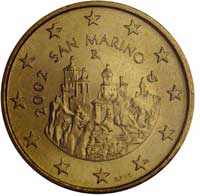 | 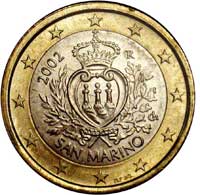 | 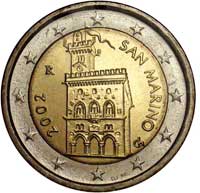 | | 20 cent | 50 cent | 1 euro | 2 euro |
The €2 commemorative coins Since 2004, the state of San Marino systematically issues each year beautiful €2 commemorative coins, only in BU condition, which do not miss originality. The €2 commemorative coins
| | 2004 | 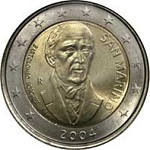 | Bartolomeo Borghesi, historian and numismatist | | 2005 | 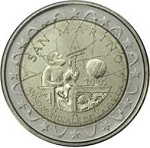 | Galileo, World Year of Physics | | 2006 | 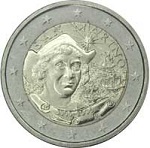 | 500th anniversary of Christopher Colombus’ death | | 2007 | 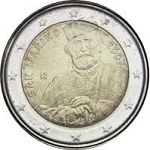 | Bicentenary of the birth of Garibaldi | | 2008 | 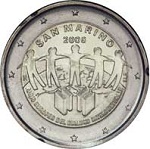 | European year of intercultural dialogue | 2009
|  | European year of creativity and innovation  |
Contact Email : pays@amisdeleuro.org Links - The website of Azienda Autonoma di Stato Filatelica E Numismatica - Agreements on the monetary relations (Monaco, San Marino, the Vatican, Andorra) (in French) - Agreement on the monetary relations with the Republic of San Marino (in French)
Top of page |
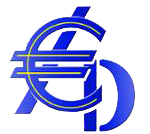 AD€ - Les Amis de l'Euro
AD€ - Les Amis de l'Euro














